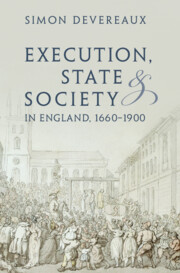Book contents
- Execution, State and Society in England, 1660–1900
- Series page
- Execution, State and Society in England, 1660–1900
- Copyright page
- Dedication
- Contents
- Figures
- Images
- Tables
- Acknowledgments
- Abbreviations
- 1 Introduction
- 2 Executions for Treason, 1660–1820
- 3 Changing Cultures of Execution: Religion and Feeling, 1660–1770
- 4 Changing Cultures of Execution: Reason and Reforms, 1770–1808
- 5 The Murder Act: Anatomization, 1752–1832
- 6 The Murder Act: Hanging in Chains, 1660–1834
- 7 The “Bloody Code” Debated, 1808–1821
- 8 The “Bloody Code” Diminished, 1822–1830
- 9 The Vicissitudes of Public Execution, 1830–1900
- 10 Conclusion
- Archival and Digital Sources
- Index
7 - The “Bloody Code” Debated, 1808–1821
Published online by Cambridge University Press: 12 October 2023
- Execution, State and Society in England, 1660–1900
- Series page
- Execution, State and Society in England, 1660–1900
- Copyright page
- Dedication
- Contents
- Figures
- Images
- Tables
- Acknowledgments
- Abbreviations
- 1 Introduction
- 2 Executions for Treason, 1660–1820
- 3 Changing Cultures of Execution: Religion and Feeling, 1660–1770
- 4 Changing Cultures of Execution: Reason and Reforms, 1770–1808
- 5 The Murder Act: Anatomization, 1752–1832
- 6 The Murder Act: Hanging in Chains, 1660–1834
- 7 The “Bloody Code” Debated, 1808–1821
- 8 The “Bloody Code” Diminished, 1822–1830
- 9 The Vicissitudes of Public Execution, 1830–1900
- 10 Conclusion
- Archival and Digital Sources
- Index
Summary
Whig and revisionist historians alike have argued that the efforts of Samuel Romilly and James Mackintosh to reform criminal law between 1808 and 1821 were easily thwarted by a resolute Tory ministry and an ambivalent public opinion. The cause of reform was in fact more powerful than either perspective allows. Urbane public opinion lamented England’s increasingly unique adherence to a wide-ranging death penalty and viewed its victims in more compassionate terms than ever before. Conservatives clung to William Paley’s arguments that a selectively enforced “Bloody Code” was both genuinely deterrent and preferable to either preventive policing or the wider use of secondary punishments. There were limits to the logic of the positions espoused by reformers and conservatives alike. By the 1820s, however, there was good reason to believe that the reform cause was already won in the House of Commons and that victory in the Lords was at least conceivable.
- Type
- Chapter
- Information
- Execution, State and Society in England, 1660–1900 , pp. 244 - 283Publisher: Cambridge University PressPrint publication year: 2023

